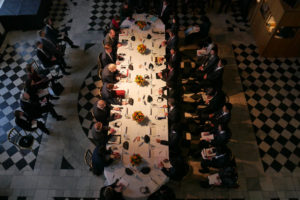
The last time British and Japanese Foreign and Defence ministers met in the “2+2” format with their Japanese counterparts, it was in the splendid setting of the former Royal Naval College at Greenwich. This time, under COVID, it will take place virtually, from electronic conference suites in Whitehall and the Japanese equivalent, Kasumigaseki.
But the dialogue will be just as warm and even more substantial. The bilateral security relationship has moved on significantly since last time. Japan strongly welcomes the UK’s “Indo Pacific Tilt” which is expected to emerge from our forthcoming Integrated Review of Defence, Security, Foreign and Development strategy. This mirrors their welcome in the economic sphere for our application to join the CPTPP trans pacific trade pact.
Ministers do two things at these meetings. They share perspectives on regional and global developments. And they agree specific practical actions where we can work together even more closely in support of our shared aims and values. Japan has a new Prime Minister, the US a new President, and the UK is now charting new directions following our departure from the EU. So there will be a lot to talk about. It is also an opportunity to discuss some of the very latest emerging issues, such as the situation in Myanmar.
During my four years in Tokyo, we have seen growing joint activity between the British Navy, Army and Airforce and their Japanese Self Defence Force counterparts. In particular we’ve seen a significant increase in the number of RN ships visiting Japan for exercises, including the enforcement of UN sanctions on North Korea. Defence Secretary Ben Wallace will set out our thinking on the plans for our new Aircraft Carrier, HMS QUEEN ELIZABETH, to visit the region later this year, which will be a very visible symbol of our commitment to the Indo Pacific.
Ministers will also discuss increasing Anglo-Japanese cooperation further afield, in South East Asia and East Africa, helping to build local capacity, in areas like maritime and aviation security. In Kenya, for example, Japan donated new patrol boats to the coastguard and Britain provided the training.
Nowadays the definition of challenges to our security runs much wider than the traditional ones. The four ministers will discuss the global health challenges of COVID, and how Japan and Britain can help provide vaccines in developing countries. With Development and Foreign Policy issues now together in a single ministry, FCDO, Foreign Secretary Dominic Raab will be able to ensure that Development is fully integrated into the discussions.
And with the UK hosting the COP 26 UN Climate Change meeting in November, and Japan recently committing itself to Net Zero greenhouse gas emissions by 2050, ministers will want to explore how to ensure that COP26 delivers the ambitious new commitments that are essential to securing our future. The UK side will also set out our plans for hosting the G7 this year, a very important gathering for both Japan and the UK. Let’s hope that by the time the next 2+2 with Japan comes around, we’ll be doing it in person again.
